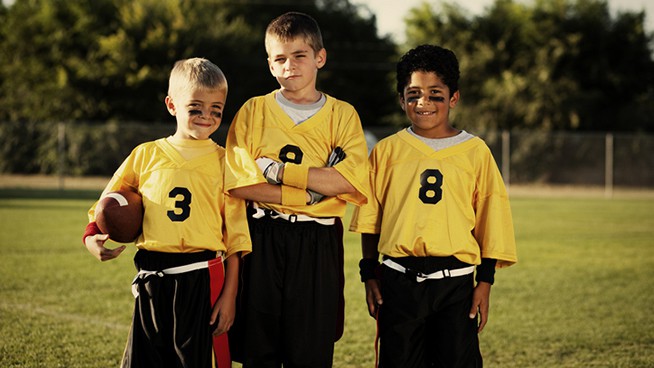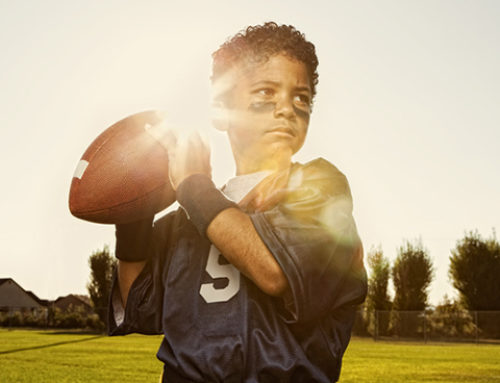The Importance of a Summer Schedule
From September through June, scheduled classes, practice and games keep you on a tight timetable. You know when to get up, when to eat, when to practice and when to play. Come summertime, that predictability is lost, leaving you susceptible to inconsistent patterns—including your training—which lead to inconsistent results.
"Once you are in a routine, it’s the consistency factor that can best help you measure results," explains Eric Lichter, director of sports performance for Ohio State football. "When players are stop-and-go in their training and nutrition, it’s hard to pinpoint a program’s positives and negatives. Whereas, for an athlete who’s consistent, it’s easier to tweak the program here and there to help him maximize his potential."
Training
To make the most of your training program, Lichter recommends putting all of your workouts, camps, and work and class schedules on a calendar. "Training with great pre-planning is always the most efficient," he says. "If you have the big picture of what you’re trying to accomplish, when your rest periods are and so forth, then you can appropriately plan social events and other obligations that won’t affect your training or your training gains." He also advises including a vacation in your schedule [after all, it is summer!]. That way, "your body gets a little break—a chance to recover and repair—and your mind gets a break to focus on some fun."
Remember, if you think of summer as an extended vacation, you put yourself and your team at a disadvantage. “If you’re required to do a certain amount of work and you don’t do it all, you’re not carrying your weight on a team,” Lichter says. “The other problem is that your play will be inconsistent. If we can’t count on you to show up and get all the workouts in, how can we count on you to show up and make plays on the field?”
Nutrition
As for your diet, Dr. Liz Applegate, the Oakland Raiders’ nutritionist and a consultant to professional athletes of all sports, stresses starting every morning with breakfast. "If you’re trying to build size, it’s important to eat consistently around whatever summer training program you have," she says. "Even if you have the luxury of sleeping in, [you should] still get up and make sure you have a high quality breakfast."
She adds, "With the warmer temperatures, you may not feel like eating. [Heat] can suppress the appetite, but it’s important to have that morning meal." Even if you’ve got training in the morning and practice in the afternoon, it’s crucial that you don’t skip a meal. According to Applegate, skipping meals, eating junk food and eating super late will hurt your progress. "Try to be good to your body," she says. "Give it the rest and nourishment it needs to perform at its best."
RECOMMENDED FOR YOU
MOST POPULAR
The Importance of a Summer Schedule
From September through June, scheduled classes, practice and games keep you on a tight timetable. You know when to get up, when to eat, when to practice and when to play. Come summertime, that predictability is lost, leaving you susceptible to inconsistent patterns—including your training—which lead to inconsistent results.
"Once you are in a routine, it’s the consistency factor that can best help you measure results," explains Eric Lichter, director of sports performance for Ohio State football. "When players are stop-and-go in their training and nutrition, it’s hard to pinpoint a program’s positives and negatives. Whereas, for an athlete who’s consistent, it’s easier to tweak the program here and there to help him maximize his potential."
Training
To make the most of your training program, Lichter recommends putting all of your workouts, camps, and work and class schedules on a calendar. "Training with great pre-planning is always the most efficient," he says. "If you have the big picture of what you’re trying to accomplish, when your rest periods are and so forth, then you can appropriately plan social events and other obligations that won’t affect your training or your training gains." He also advises including a vacation in your schedule [after all, it is summer!]. That way, "your body gets a little break—a chance to recover and repair—and your mind gets a break to focus on some fun."
Remember, if you think of summer as an extended vacation, you put yourself and your team at a disadvantage. “If you’re required to do a certain amount of work and you don’t do it all, you’re not carrying your weight on a team,” Lichter says. “The other problem is that your play will be inconsistent. If we can’t count on you to show up and get all the workouts in, how can we count on you to show up and make plays on the field?”
Nutrition
As for your diet, Dr. Liz Applegate, the Oakland Raiders’ nutritionist and a consultant to professional athletes of all sports, stresses starting every morning with breakfast. "If you’re trying to build size, it’s important to eat consistently around whatever summer training program you have," she says. "Even if you have the luxury of sleeping in, [you should] still get up and make sure you have a high quality breakfast."
She adds, "With the warmer temperatures, you may not feel like eating. [Heat] can suppress the appetite, but it’s important to have that morning meal." Even if you’ve got training in the morning and practice in the afternoon, it’s crucial that you don’t skip a meal. According to Applegate, skipping meals, eating junk food and eating super late will hurt your progress. "Try to be good to your body," she says. "Give it the rest and nourishment it needs to perform at its best."











